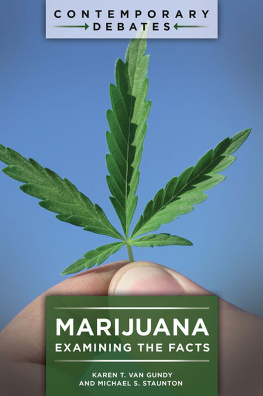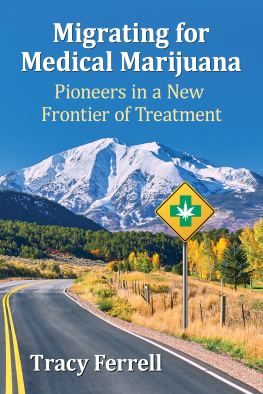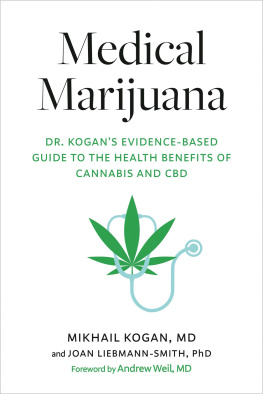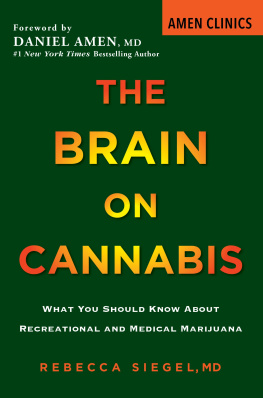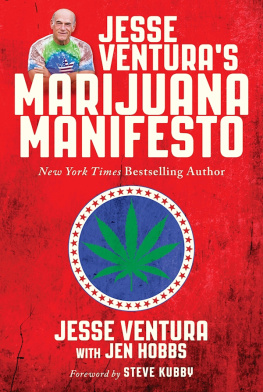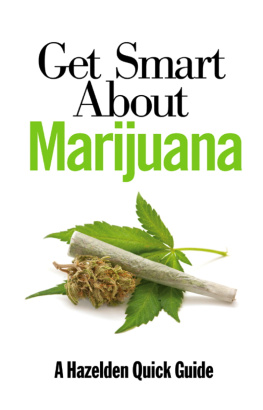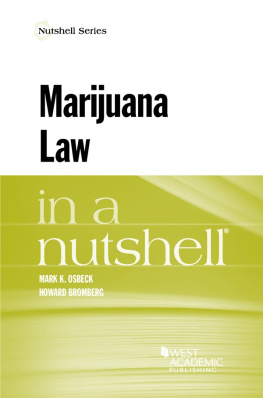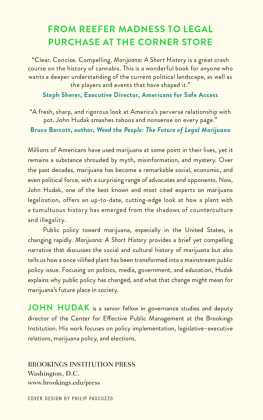Marijuana
Recent Titles in Contemporary Debates
The Affordable Care Act: Examining the Facts
Purva H. Rawal
Climate Change: Examining the Facts
Daniel Bedford and John Cook
Immigration: Examining the Facts
Cari Lee Skogberg Eastman
MARIJUANA
Examining the Facts
Karen T. Van Gundy and Michael S. Staunton
Contemporary Debates
Copyright 2017 by ABC-CLIO, LLC
All rights reserved. No part of this publication may be reproduced, stored in a retrieval system, or transmitted, in any form or by any means, electronic, mechanical, photocopying, recording, or otherwise, except for the inclusion of brief quotations in a review, without prior permission in writing from the publisher.
Library of Congress Cataloging-in-Publication Data
Names: Van Gundy, Karen T., author. | Staunton, Michael S., author.
Title: Marijuana: examining the facts / Karen T. Van Gundy and Michael S. Staunton.
Description: Santa Barbara, California: ABC-CLIO, [2017] | Series: Contemporary debates | Includes bibliographical references and index.
Identifiers: LCCN 2017016411 (print) | LCCN 2017026593 (ebook) | ISBN 9781440836732 (ebook) | ISBN 9781440836725 (alk. paper)
Subjects: LCSH: MarijuanaSocial aspects. | MarijuanaTherapeutic use. | MarijuanaGovernment policy.
Classification: LCC HV5822.M3 (ebook) | LCC HV5822.M3 V36 2017 (print) | DDC 362.29/5dc23
LC record available at https://lccn.loc.gov/2017016411
ISBN: 978-1-4408-3672-5
EISBN: 978-1-4408-3673-2
21 20 19 18 17 1 2 3 4 5
This book is also available as an eBook.
ABC-CLIO
An Imprint of ABC-CLIO, LLC
ABC-CLIO, LLC
130 Cremona Drive, P.O. Box 1911
Santa Barbara, California 93116-1911
www.abc-clio.com
This book is printed on acid-free paper 
Manufactured in the United States of America
Contents
Marijuana: Examining the Facts is one of the first volumes in ABC-CLIOs new Contemporary Debates reference series. Each title in this new series, which is intended for use by high school and undergraduate students as well as members of the general public, examines the veracity of controversial claims or beliefs surrounding a major political/cultural issue in the United States. The purpose of the series is to give readers a clear and unbiased understanding of current issues by informing them about falsehoods, half-truths, and misconceptionsand confirming the factual validity of other assertionsthat have gained traction in Americas political and cultural discourse. Ultimately, this series has been crafted to give readers the tools for a fuller understanding of controversial issues, policies, and laws that occupy center stage in American life and politics.
Each volume in this series identifies questions swirling about the larger topic under discussion. These questions are examined in individualized entries, which are in turn arranged in broad subject chapters that cover certain aspects of the issue being examined, that is, history of concern about the issue, potential economic or social impact, findings of latest scholarly research, and others.
Each chapter features 410 individual entries. Each entry begins by stating an important and/or well-known Question about the issue being studied. The entry then provides a concise and objective one- or two-paragraph Answer to the featured question, followed by a more comprehensive, detailed explanation of The Facts . This latter portion of each entry uses quantifiable, evidence-based information from respected sources to fully address each question and provide readers with the information they need to be informed citizens. Importantly, entries will also acknowledge instances in which conflicting data exist or data are incomplete. Finally, each entry concludes with a Further Reading section providing users with information on other important and/or influential resources.
The ultimate purpose of every book in the Contemporary Debates series is to reject false equivalence, in which demonstrably false beliefs or statements are given the same exposure and credence as the facts; to puncture myths that diminish our understanding of important policies and positions; to provide needed context for misleading statements and claims; and to confirm the factual accuracy of other assertions. In other words, volumes in this series are being crafted to clear the air surrounding some of the most contentious and misunderstood issues of our timenot just add another layer of obfuscation and uncertainty to the debate.
According to current U.S. federal law, marijuana is a Schedule I controlled substance, suggesting that it has a high potential for misuse (abuse or dependence), no currently accepted medical use, and a lack of accepted safety for use under medical supervision. Many state-level laws, however, do allow for medical marijuana use, and some states have legalized marijuana for recreational use. As of the 2016 U.S. election, comprehensive medical marijuana laws existed in 29 states, the District of Columbia, Guam, and Puerto Rico, and in 8 statesAlaska, California, Colorado, Maine, Massachusetts, Nevada, Oregon, and Washingtonrecreational use of marijuana had been legalized. Although such laws are at odds with the federal laws about marijuana, the federal government has not actively prosecuted medical marijuana distributors in states with medical marijuana provisions, and it has deferred its right to challenge... legalization laws in states like Colorado or Washington (National Conference of State Legislators 2016). With recent changes in the composition of the federal government, however, the conflict between state and federal government approaches to marijuana policy could become more contentious. When making decisions about marijuana-related practice and policy, it is thus crucial to consider carefully the facts about the possible benefits or harms associated with marijuana use or misuse.
CONTROLLED SUBSTANCE SCHEDULES
| Schedule I Controlled Substances | Substances in this schedule have no currently accepted medical use in the United States, a lack of accepted safety for use under medical supervision, and a high potential for abuse. |
| Examples: heroin, lysergic acid diethylamide (LSD), marijuana (cannabis), peyote, methaqualone, and 3,4 'methylenedioxymethamphetamine (Ecstasy). |
| Schedule ItyllN Controlled Substances (2/2N) | Substances in this schedule have a high potential for abuse, which may lead to severe psychological or physical dependence. |
| Examples: hydromorphone (Dilaudid), methadone (Dolophine), oxycodone (OxyContin, Percocet), fentanyl (Sublimaze, Duragesic), morphine, opium, amphetamine (Dexedrine, Adderall), methamphetamine (Desoxyn), and methylphenidate (Ritalin). |
| Schedule III/IIIN Controlled Substances (3/3N) | Substances in this schedule have a potential for abuse less than substances in Schedules I or II and abuse may lead to moderate or low physical dependence or high psychological dependence. |
| Examples: products containing not more than 90 milligrams of codeine per dosage unit (Tylenol with Codeine), buprenorphine (Suboxone), ketamine, and anabolic steroids such as DepO'Testosterone. |
| Schedule IV Controlled Substances | Substances in this schedule have a low potential for abuse relative to substances in Schedule III. |

